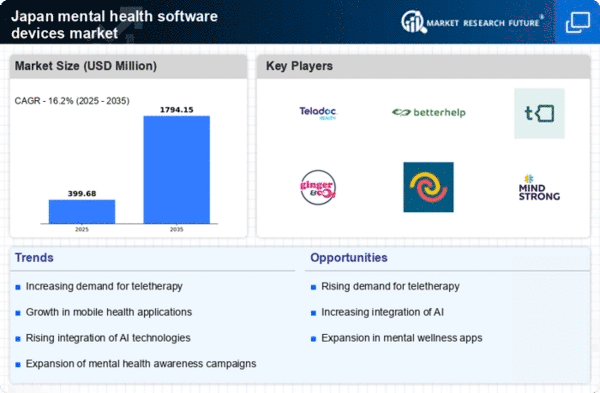The Japan Mental Health Software Devices Market showcases a dynamic landscape characterized by a range of innovative solutions aimed at improving mental well-being through technology. As awareness of mental health issues increases, the demand for effective software and devices that provide therapy, monitoring, and support has surged significantly.
Numerous local and international firms are vying for market share, collaborating with healthcare providers, and integrating cutting-edge technologies such as artificial intelligence and telehealth to cater to the needs of consumers. The competitive insights reveal a market in which companies are not only focused on software development but also on creating holistic ecosystems that support mental health management, thus fostering collaborations and strategic partnerships that enhance their market position.
Sony has established a notable presence in the Japan Mental Health Software Devices Market through its innovative approach to integrating technology and mental well-being. Known for its commitment to quality and technological advancements, Sony has leveraged its expertise in electronic devices and software development to create mental health-focused products tailored for the Japanese market.
The company’s strengths lie in its robust research and development capabilities, which allow it to design user-centric solutions that resonate with consumer needs. Sony's ability to blend entertainment with wellness, along with its existing distribution channels and brand reputation, positions it favorably within this competitive landscape. Its research-backed methods and technology-driven initiatives contribute significantly to enhancing mental health services, underscoring the importance of clinical efficacy and consumer satisfaction.
M3 plays a crucial role in the Japan Mental Health Software Devices Market, particularly through its offerings designed for healthcare professionals. With a focus on telemedicine and healthcare solutions, M3 has introduced key products and services aimed at providing mental health support, including platforms that facilitate online consultations and digital health management tools.
The company is well-positioned in the market due to its established relationships with healthcare providers, enabling easier integration of its solutions into existing health systems. M3’s strengths include its dedication to innovation and its strategic partnerships that enhance its product offerings and reach. Additionally, M3 has engaged in mergers and acquisitions, expanding its capabilities and market presence, thus enabling better access to mental health services throughout Japan.
The company’s continuous efforts to improve mental health care highlight its commitment to addressing the growing concerns surrounding mental well-being in the region.









